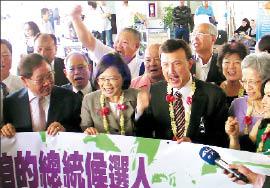The arrival of Democratic Progressive Party (DPP) presidential candidate Tsai Ing-wen (蔡英文) in Manila yesterday has seemingly ignited an underlying tussle between the pro-independence and pro-unification forces in the local Chinese-speaking expatriate community.
The DPP leader was warmly greeted by about 20 Taiwanese expatriates at Manila Ninoy Aquino International Airport. Their shouts of tong-suan (凍蒜, meaning “get elected” in Hoklo, also known as Taiwanese) drew curious glances from passersby at the airport.
Taiwanese Representative to the Philippines Donald Lee (李傳通) also welcomed Tsai at the airport.

Photo: CNA
Accompanied by DPP legislators Yu Tien (余天) and Tsai Huang-liang (蔡煌瑯) former Overseas Compatriot Affairs Commission minister Chang Fu-mei (張富美) and DPP spokesman Cheng Wen-tsang (鄭文燦), Tsai Iing-wen chatted with the well-wishers and received a courtesy custom clearance before being whisked away without taking any questions from the media.
Some Chinese groups in the Philippines, meanwhile, have run ads in local Chinese-language newspapers in recent days that call Tsai Ing-wen “a Taiwan independence activist” and said they did not welcome her visit.
To ensure security, Taiwanese businesspeople in the Philippines Manila applied for nine police officers to safeguard the DPP chairperson and her delegation during their three-day visit.
Tsai Ing-wen’s visit is mainly to attend the launch of the Philippine chapter of overseas Taiwanese businesspeople who support her presidential bid.
She will also attend the 57th Congress of the Liberal International — a London-based federation of liberal and democratic political parties around the world — in Metro Manila today, during which she will deliver a 10-minute speech on human rights and trade and meet with party leaders from other countries.
She will also attend a fundraising dinner for her campaign as the standard bearer of the party in January’s presidential election.
Organizers of the fundraiser have already collected 6.5 million pesos (US$148,640).
Tsai is expected to return to Taiwan tomorrow afternoon.

Taiwan is to commence mass production of the Tien Kung (天弓, “Sky Bow”) III, IV and V missiles by the second quarter of this year if the legislature approves the government’s NT$1.25 trillion (US$39.78 billion) special defense budget, an official said yesterday. Commenting on condition of anonymity, a defense official with knowledge of the matter said that the advanced systems are expected to provide crucial capabilities against ballistic and cruise missiles for the proposed “T-Dome,” an advanced, multi-layered air defense network. The Tien Kung III is an air defense missile with a maximum interception altitude of 35km. The Tien Kung IV and V

The disruption of 941 flights in and out of Taiwan due to China’s large-scale military exercises was no accident, but rather the result of a “quasi-blockade” used to simulate creating the air and sea routes needed for an amphibious landing, a military expert said. The disruptions occurred on Tuesday and lasted about 10 hours as China conducted live-fire drills in the Taiwan Strait. The Civil Aviation Administration (CAA) said the exercises affected 857 international flights and 84 domestic flights, affecting more than 100,000 travelers. Su Tzu-yun (蘇紫雲), a research fellow at the government-sponsored Institute for National Defense and Security Research, said the air

Taiwan lacks effective and cost-efficient armaments to intercept rockets, making the planned “T-Dome” interception system necessary, two experts said on Tuesday. The concerns were raised after China’s military fired two waves of rockets during live-fire drills around Taiwan on Tuesday, part of two-day exercises code-named “Justice Mission 2025.” The first wave involved 17 rockets launched at 9am from Pingtan in China’s Fujian Province, according to Lieutenant General Hsieh Jih-sheng (謝日升) of the Office of the Deputy Chief of the General Staff for Intelligence at the Ministry of National Defense. Those rockets landed 70 nautical miles (129.6km) northeast of Keelung without flying over Taiwan,

A strong continental cold air mass is to bring pollutants to Taiwan from tomorrow, the Ministry of Environment said today, as it issued an “orange” air quality alert for most of the country. All of Taiwan except for Hualien and Taitung counties is to be under an “orange” air quality alert tomorrow, indicating air quality that is unhealthy for sensitive groups. In China, areas from Shandong to Shanghai have been enveloped in haze since Saturday, the ministry said in a news release. Yesterday, hourly concentrations of PM2.5 in these areas ranged from 65 to 160 micrograms per cubic meter (mg/m³), and pollutants were